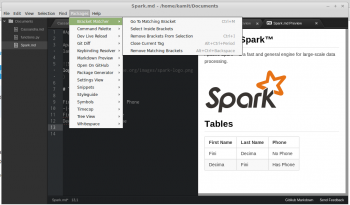

Even if we increase speed of typing/navigation by 10%, it won't actually make us a better programmer. However, the speed increase of mastering a cool text-editor is not actually that much. Without that knowledge it can get a bit awkward for beginners. Hint: To close out of vim, press escape key and type ":q".
#Ubuntu gitbook editor how to#
To get an idea of how to work with vim, install it and play around with the first few chapters of the built in tutorial by running the command vimtutor from the terminal. Vi and vim can be considered roughly equivalent when it comes to their core shortcuts.
#Ubuntu gitbook editor code#
By offering powerful commands inside of the text editor, a programmer can speed up their navigation of a code base and type faster. What makes vi/vim/emacs/other terminal-based text editors special is their extensibility and keyboard based shortcuts. Nobody won, everyone wasted time, and if you hear anybody today talking about why one is better than the other, ignore them. Notably, there was once something named "The Editor Wars", when nerds argued with each other if emacs or vim was better. Don't worry about learning it, but it is good to know they exist. The final major terminal-based text editors is named emacs. You can always lean on nano, but vi/vim gets the job done, better. Because vi/vim are always available, I believe it is the best family of editors to learn initially. If I don't have the permissions to sudo apt-get install vim or anything else, I am going to be using vi, so it's easier for me to just use that for my terminal text-editing needs. Most prominently, I often find myself using vi on computers I do not have the ability to install new programs on. I think it is better to initially learn vi/vim because it has more market share. It has a more modern, more advanced successor named vim. The other editor that comes with all Ubuntu distros is named vi. With that said, it doesn't really have any advanced features, so while it's perfect for a minimal experience, if you're going to be coding you likely want something more advanced (aka hardcore and hackerish). It's as easy as it gets, it works great, and it's basically everywhere. The keys to save and do other functionality are displayed at the bottom, no tutorial needed. To open it, type nano and just start working. It's basic, it's functional, and it gets the job done. The default editor that comes with most Linux distros is named nano. If you are SSH'd into a box, or using a server build, you will have to learn how to use a terminal text editor. Gedit is a good option if you are on an Ubuntu desktop, but many times you just won't have a GUI at all. Those people are silly and you should ignore anyone who thinks that text editor choice has anything to do with how good of a hacker you are. Many people who like to think they are badasses think they are too cool for gedit. I use it all the time to display information and make notes, but I also program in it every once in a while.

gedit is a GUI application, and gives you a nice window, normal use of your mouse, copy/paste, and all the normal things you expect from a text editor, similar to Notepad on Windows. To open Gedit, simply type $ gedit & in the terminal, or open it from the GUI. Ubuntu comes with a few text editors installed initially, but the ones we will focus on are gedit and vi/vim. I used to use the most complicated text editor I could so I looked cool, now I use the simplest ones I can for the job at hand. As a general rule, use what works for you and don't seek out complexity for complexities sake. Many have entire programming languages built into them, or are even shells themselves, capable of executing programs. Some are simple and have a GUI, some are terminal only and are incredibly complex. There are hundreds of text editors, and much like programming languages, each has its own tradeoffs. Echoing and cating text only gets you so far. When we write programs, edit config files, or even take notes to study later, we will do that with a text editor. Roppers Your Resume and Portfolio Buildingīuild a Website with HTML CSS and Javascript


 0 kommentar(er)
0 kommentar(er)
